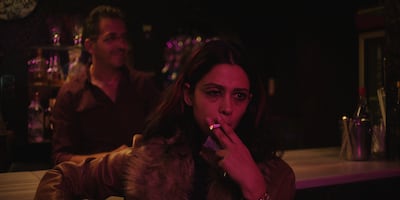“I always wanted to direct,” says Bassel Ghandour, who co-wrote and produced the Oscar-nominated and Bafta award-winning film Theeb. “The experience of Theeb was amazing in the sense that it was a very collaborative effort on every front and every single member of that crew wore a million hats. For example, I was doing acting workshops, location scouting and wrote the film, so I guess I wasn’t your typical producer.
"But making that film gave me the itch, and I knew that directing was where I was heading.”
More than six years later, Ghandour has made it to Switzerland's Locarno Film Festival, where his riotous and fun directorial debut The Alleys had its world premiere. The film played on the Piazza Grande, where every year, the festival builds the largest cinema screen in Europe and thousands watch movies under the stars.
The Alleys premiere took place in front of 5,000 people. Ghandour says perhaps it's fate that the premiere took place there, because “it’s fun showing a film about Jordanian alleys in the Swiss alleys".
The film is set in Jordan’s Jabal al Natheef district in East Amman, and it’s about how the neighbourhood is fuelled by gossip. He first had the idea in 2015 and, after several stop-starts, he went with his friend, Mahmoud Abu Faha, to experience the area for himself. Faha grew up there and was able to put everyone at ease with a filmmaker snooping around.

“We’d walk around the streets and meet various characters,” says the director. “Everybody had a story, and you couldn’t tell what was gossip and what was real. It was impossible. But in the end, you realise that the truth is irrelevant because gossip is the spirit of the place. Neighbourhoods like this exist across Jordan and the Middle East, in Palestine, Lebanon, Syria and Iraq.”
In The Alleys, a narrator tells the story of several characters living in the neighbourhood. The charming Ali is a hustler who doesn’t even tell his girlfriend Lana how he earns his living. But she has secrets of her own, as she’s keeping her relationship with him from her mother, Aseel.
Everyone minds their own business until Aseel receives a video of Lana and Ali together that comes with a blackmail demand, or the mysterious sender will put the offending material on the internet. So Aseel seeks the help of local gangster Abbas to catch the blackmailer and break up her daughter’s relationship.
And this is only the first chapter of this genre-busting pulp satire.

The film stars Emad Azmi as Ali, Baraka Rahmani as Lana, Munther Rayahnah as Abbas, Nadira Omran as Aseel and Maisa Abd Elhadi as Abass’s partner Hanadi.
A contemporary thriller told in a fun, fast-paced and exhilarating style, it’s the total opposite of the assured pacing of Theeb, which was a historical period drama that sheds light on a prominent moment when Arabs revolted against the Ottoman Empire.
“I’m a fan of popular cinema,” says Ghandour of his desire to make more mainstream movies. “Growing up in Jordan, we weren’t exposed to indie films, foreign films and whatnot. The extent of alternative cinema to us was Lock, Stock and Two Smoking Barrels, Snatch and Fargo.”
The Alleys is influenced by all three of these films, especially in the way it twists and turns and constantly surprises. It’s impossible to second-guess what will happen. “Part of the drive to make The Alleys is that films from the region are typically either very art-house, politically driven or issue films. It doesn’t feel like there are genre, audience crowd-pleasers, so I wanted to make one.”

He was curious about what would happen if he made something in the gap between the art house and the multiplex. “I wanted to make something that was more to my taste growing up,” he says. “I was asking myself, what would 18-year-old me enjoy? I’m curious to see how a Jordanian film like this will play in the cinema to Arab audiences.”
He expects the region's audiences will connect with the film, as it deals with how the public perception of people's lives is so different from what goes on in private. “Ali is presenting his best self the whole time, pretending to have a prestigious job and whatnot, and it comes out of a need to please what society expects of you.
“The big thing that comes through is that most of the characters are presenting themselves in a way that is not true to who they actually are, their desires and motivations.”
It also deals with the idea that shame doesn't affect just you, but your whole family. “Reputation is huge in the Arab world,” says the director. “Shame and honour are very much connected to reputation. For the male characters, it’s all about being respected on the streets or having a respectable job. And for the female characters, society expects purity and innocence.”
Ghandour became part of the community in preparation for the film, which was shot in October 2019. "The locals were part of the film. There is no way to shoot there otherwise. You can’t helicopter a film crew in and impose yourself. They have to be part of the process.”


